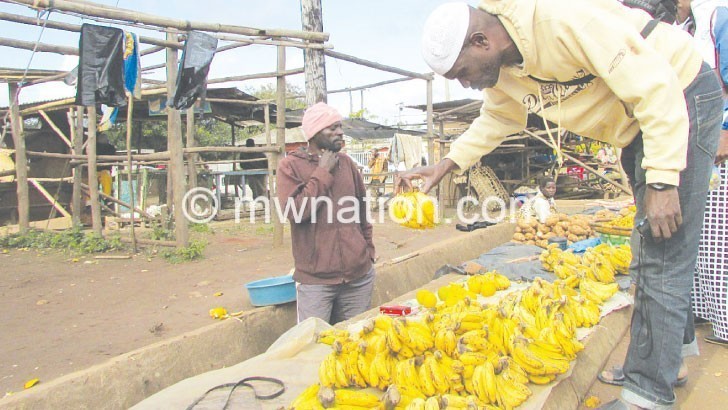Reclaiming Thyolo’s banana status
Stories abound that when a baby cried in Thyolo, the mother gave it a banana before breastfeeding it.
That is how Thyolo natives proudly but jokingly talked big of the abundance of the fruit they valued most – bananas.
It was not until the evergreen canopy surrounding homes turned yellow, wilted and then completely dried that the mothers learnt to breastfeed a crying baby.

The banana plantations on which the people’s livelihoods depended slowly succumbed to an unknown disease, rendering them destitute.
In an apparent resignation to her fate, Rose Julio, 56, helplessly gazed at her banana garden which used to be her only source of livelihood being wiped out by Banana Bunchy Top disease also known as Chisaka in vernacular.
Julio saw her life crumbling down because she could not imagine life without bananas.
“I depended on bananas all my life. Losing the crop was a blow to the whole community,” laments Julio, a mother of eight who also looks after some grandchildren.
Thyolo remains a shadow of its former self as it has only one banana seller at the district’s main market.
The trader, Maxwell Chipoya, plying his business at Thyolo Boma Market, says life is tough now because he struggles to get bananas.
“We get the bananas from Mozambique through Mulanje. Sometimes our friends from that side bring the fruit here but it is expensive.
“My business has been greatly affected, but there’s nothing I can do; I just have to struggle to make ends meet,” Chipoya says.
Not long ago, Mulanje and Thyolo were the banana fruit basket supplying Blantyre, Lilongwe and Zomba. Truckloads of bananas were on the roads to the cities every day.
When the Banana Bunchy Top disease was discovered in the early 1990s, people did not anticipate that it would cause huge havoc.
With the passage of time, the disease engulfed major banana growing districts across the country.
Immediately, the Ministry of Agriculture, Irrigation and Water Development responded by advising famers to uproot and burn all the affected bananas in the fields.
However, some farmers did not comply.
Over time, the supply of the fruit in the country’s markets started to dwindle and later became scarce.
The development forced people in banana fruit business to cross the borders to Mozambique and Tanzania.
A visit to most markets established that benches were dominated by bananas from Tanzania and Mozambique – a very unfortunate situation for the country’s economy.
But Julio and Chipoya as well as Malawians at large have a reason to smile as Thyolo has started producing bananas from the newly grown plantations distributed through Agriculture Sector Wide Approach Project (Aswap) 1.
Aswap which started distributing banana suckers in 2016 was working with the agriculture sector in persuading farmers to uproot and burn the affected crops.
Thyolo crops officer Fredson Banda says the reluctant farmers did not understand the logic of destroying the existing stems because despite being affected, the crops provided them with a little income.
“It wasn’t easy to convince farmers to uproot the stems. But with the help of extension workers, most farmers complied with the order. The exercise involved the police, whenever necessary,” he says.
Over 50 farming families in Chidzinja Village in Traditional Authority (T/A) Mphuka’s area are banking on the village nursery, which has close to 200 plants, to get clean suckers.
Village Head Chidzinja says considering how the nurseries were doing, there was hope that any time soon every household would have bananas just as it was before.
Apart from promoting banana production in Thyolo, Aswap, in its quest to complement agricultural production is also geared to improve road infrastructure in the district.
About 17 roads are earmarked for construction to enable banana farmers have easy access to markets.
Aswap’s desk officer for Thyolo Richard Thole is optimistic that the district will soon reclaim its lost glory in banana production.
“By the end of this year, 2019, Thyolo will be back to its status as a major banana producing district in the country,” Thole says, confidently.
Traditional leaders are at the centre of the construction and management of the humidity chambers to ensure maximum protection from vandalism.
“The skills acquired through the chamber nurseries will help farmers to continue propagating the suckers and share them to other members of the community in future.
“With good management, bananas take only six months from planting to harvest; so there is hope that bananas will start flooding markets by the end of this year,” Thole says.





